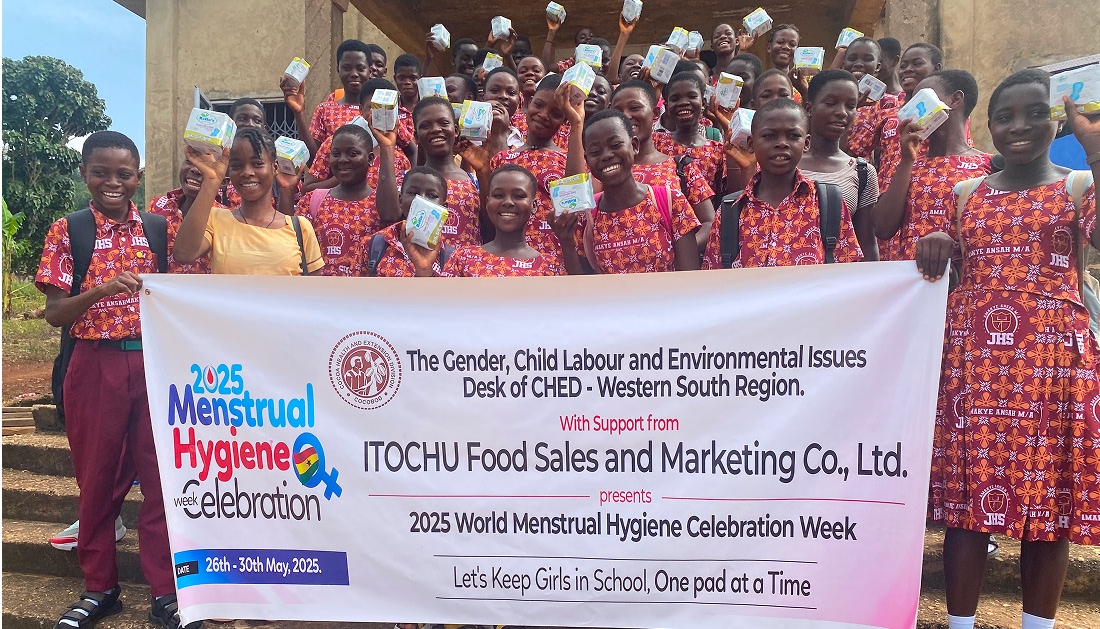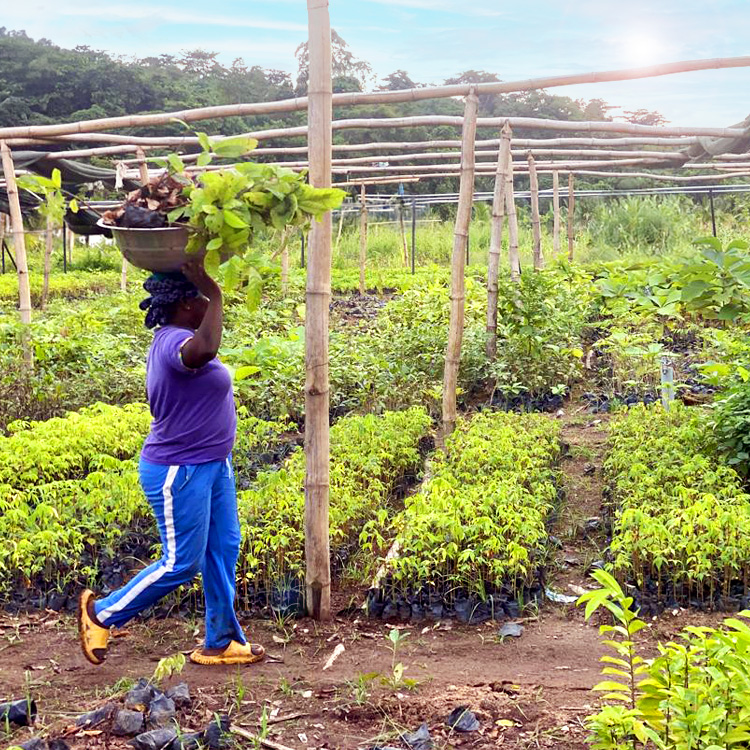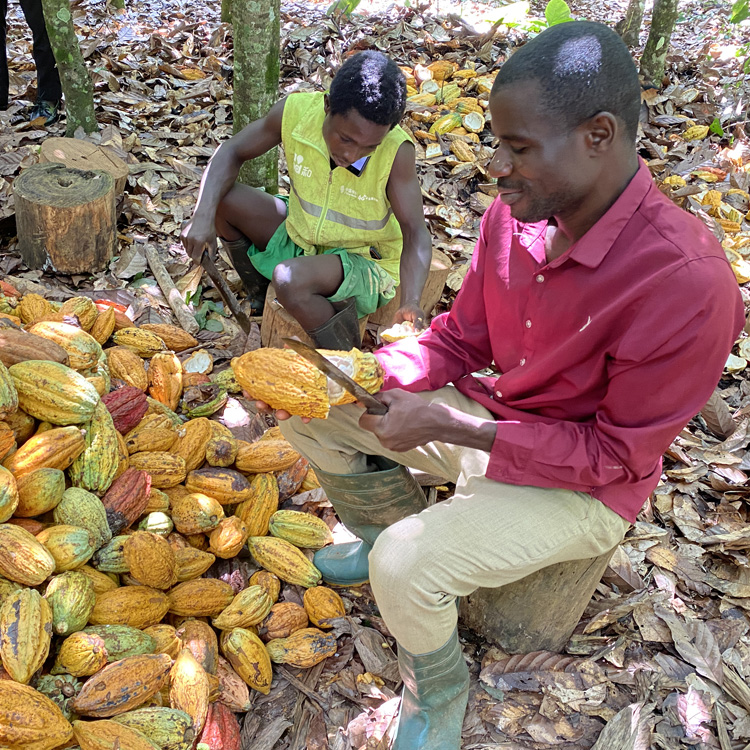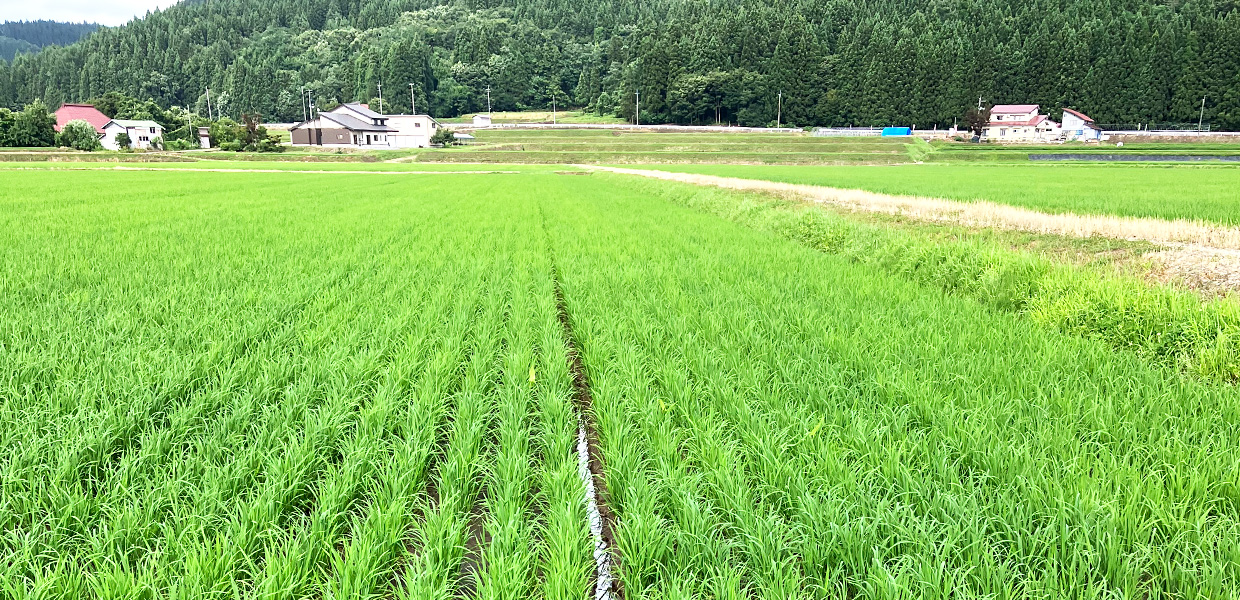Sustainable Activities
SustainabilityITOCHU Food Sales and Marketing's Initiatives
Support for Menstrual Hygiene Day in Ghana


In alignment with Menstrual Hygiene Day on May 28, we sponsored the Menstrual Hygiene Week Celebration organized by the CHED*1 Western South Regional Office in Ghana's cocoa-producing regions. This event aims to address limited access to menstrual products—one of the barriers to girls' education in African countries including Ghana—while promoting gender equality, raising awareness about menstruation, and improving quality of life. By supporting this initiative, our company seeks to protect the health of future cocoa farmers, contribute to the elimination of child labor in cocoa-producing communities, and help build a sustainable cocoa industry.
*1 CHED stands for Cocoa Health and Extension Division, a division under COCOBOD, the central government agency responsible for overseeing, supporting, and promoting Ghana's cocoa industry. CHED plays a key role in providing guidance and support for pre-harvest cocoa production, helping farmers improve cultivation practices and ensuring the sustainability of cocoa farming communities.
Activity Overview
Period: May 26–30, 2025
Location: 15 districts in cocoa-producing areas of Western South Region
Beneficiary Schools: 75 schools, 2,026 students (including 960 supported by our company)
Activities:
- • Workshops led by the Health Directorate to promote menstrual hygiene practices, health education, and dispel misconceptions about menstruation
- • Interactive sessions by the Education Directorate to foster understanding of menstruation
- • Distribution of 6,078 packs of sanitary pads (including 2,880 packs provided through our support)

Supporting Cocoa Farmers Through New Seedlings





Cocoa can be harvested beginning the third year after the seeds were planted. The
plants bear a lot of fruit beginning in about their seventh year, reaching their peak harvest
period about 10 to 20 years after they are planted. Cocoa flowers bloom directly on the trunk of
the tree and the fruit (cocoa pods) develops there, with about 30 pods maturing at one time.
After harvesting, new flowers are already waiting on the trunk to grow into the next batch of
fruit, making cocoa a fruit that can be harvested throughout the year.
After cocoa trees pass their peak harvest period, their yield gradually decreases. If new
seeds are planted after the yield drops, it will take at least seven years to achieve a stable
harvest again. During this period, farmers’ incomes decrease.
New seedlings must be regularly planted before that disaster happens. However, in Ghana,
even when farmers want new seedlings, they often cannot obtain them due to transportation issues
or other reasons. As a result, many farmers are unable to replant as needed.
We, together with Japanese manufacturers, provide robust and high-quality seedlings to
farmers who wish to receive them in designated production areas specified by Japanese
manufacturers.
Through these activities, we support the stable income of cocoa farmers, prevent them from
leaving farming, and consistently provide high-quality cocoa beans to Japanese manufacturers.
We aim to create a society where cocoa will sustainably enable farmers, manufacturers, and
consumers to all be happy.


Supporting the Extension of Rice Fields’ Nakaboshi Periods




In Japan, which is an area that normally eats a lot of rice, 40% of the methane
(a greenhouse gas) emitted domestically comes from paddy fields. The methane from rice paddies
is generated by methanogenic bacteria, which are anaerobic bacteria that act on organic matter
that is in the soil and provided as fertilizer. To reduce the methane emissions of rice paddies,
it has been confirmed that extending the nakaboshi*1 or mid-season drainage period
typically practiced in rice cultivation by seven days more than the average over the past two
years can reduce emissions 30% compared to the normal mid-season drainage period.
Itochu Food Sales and Marketing is a company that supplies a significant amount of rice, and
we recognize our responsibility to reduce greenhouse gas emissions. We support the incomes of
rice farmers who extend the nakaboshi period using the J-Credit system*2 certified by
the government. By doing this, we contribute to a happy future for the global environment,
producers, and consumers.
*1 Nakaboshi: During the rice cultivation period, before the rice plants flower, the water in the paddy field is drained once to dry the field surface. This process prevents excessive tillering (branching from the base) and controls growth. Excessive tillering can lead to insufficient nutrients reaching the ears of rice, resulting in reduced yield and quality. However, a too dramatic nakaboshi can damage the roots and hinder growth after the young ear formation stage, leading to decreased yield. Additionally, in cold regions, it can cause the soil temperature to drop, leading to cold damage.
*2 J-Credit System: This is a carbon credit system where activities that reduce or absorb emitted greenhouse gases (GHGs) such as CO2 are quantified and certified by the government as credits. The credits created through this system can be used for various purposes, such as the achievement of the goals of the Keidanren (Japan Business Federation) Carbon Neutral Action Plan and as carbon offsets.

Engaging in Social Contribution Activities
We Support Activities of the World Food Programme


We support the activities of the Association for the World Food Programme (WFP), the only UN food aid agency dedicated to eliminating hunger and poverty. Their mission includes providing emergency assistance during disasters and conflicts, improving nutritional conditions, and providing school meals.
We Support ITOCHU Foundation Activities


We proudly and continuously support the noble endeavors of the Itochu Memorial Foundation, a public interest incorporated foundation dedicated to facilitating the healthy development of young people. Through our ongoing donations, we champion initiatives like the Children's Library Assistance Project and the Electronic Book Promotion Project, contributing to the bright and promising futures of our children.
Foundation for International Development/Relief (FIDR)



We support the activities of FIDR, which is dedicated to creating a society where children in developing countries can grow up healthy. FIDR works to improve all aspects of their living conditions and welfare, including economics and sanitation. Additionally, FIDR conducts emergency relief operations in response to domestic and international disasters.
- HOME
- Sustainability
- Sustainable Activities
